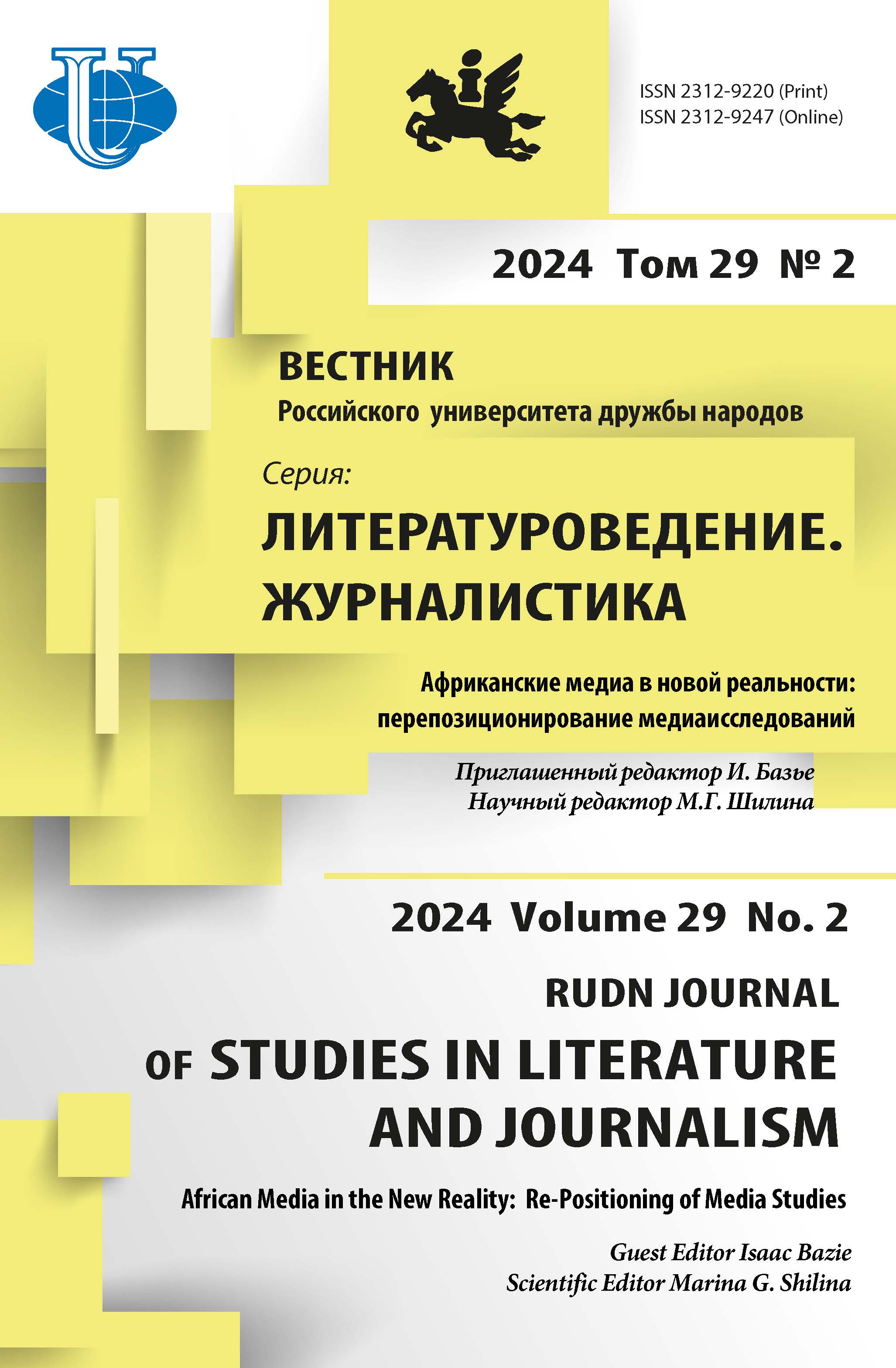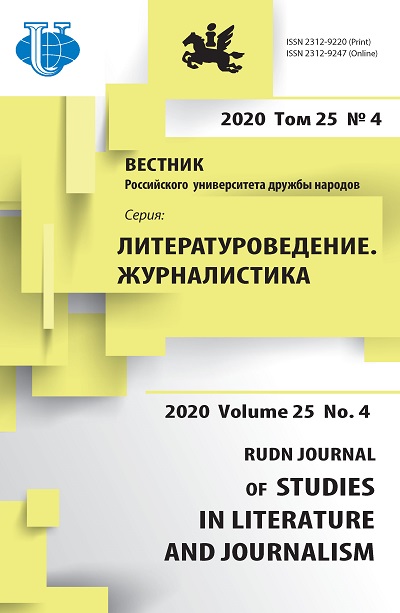Translingual text within a meaning-generating context of Russian literature
- Authors: Kulieva S.A.1
-
Affiliations:
- Peoples’ Friendship University of Russia (RUDN University)
- Issue: Vol 25, No 4 (2020)
- Pages: 657-670
- Section: LITERARY CRITICISM
- URL: https://journals.rudn.ru/literary-criticism/article/view/25451
- DOI: https://doi.org/10.22363/2312-9220-2020-25-4-657-670
Cite item
Full Text
Abstract
In this article, the translingual text in the aspect of its interconnection with the meaning-generating context of classical Russian literature is analyzed. The literary translingualism is defined as the phenomenon of writers who create texts in more than one language or in a language other than their primary one. This is an urgent problem for modern literary criticism, requiring an interdisciplinary approach to its study. Within the framework of translingualism theory, as the text is comprehended not only as a product of speech activity subjected to structural preparation. It turns into a zone of “cross-pollination” with multiple meanings, becomes a representative of cultures in their contamination, mutual repulsion, symbiosis, submission, adaptation. Intercultural communication within the literary text also affects the level of the intertext: the intertextual paradigm elements of various complexity (from selected intexts, unmodified reminiscences to expanded propositions) in a translingual text are often subject to the process of so-called intertextual acculturation, in which the intext is filled with ethnospecific linguistic and literary content. The material for the study is the literary cycle “Dreams of the Damned” (“Sny okayannykh”) by the modern Kazakhstan writer A. Zhaksylykov. Some of the intertextual echoes of the cycle with canonical texts of classical Russian literature (works by Pushkin, Yesenin, Dostoevsky, etc.) are analyzed in order to trace the adaptation process of its key motives (the motive of “flight from people”, the motive of wandering, the motive of the desert, the motive of the black man, etc.) to the Kazakh linguocultural and aesthetic reality. Using methods such as comparative analysis, linguopoetic commenting, intertextual analysis, the conclusion is made that an appeal to the literary works of the acquired language for a translingual author is necessary: they constitute his cognitive base, but at the same time undergo certain linguo-specific transformations, the result of which is generation of new images of the world.
About the authors
Sheker A. Kulieva
Peoples’ Friendship University of Russia (RUDN University)
Author for correspondence.
Email: shekkul@mail.ru
Candidate in History, Docent of the Department of Foreign Languages of the Faculty of Humanities and Social Sciences
10 Miklukho-Maklaya St, bldg 2, Moscow, 117198, Russian FederationReferences
- Kellman, S.G. (2019). Literary Translingualism: What and Why? Polylinguality and Transcultural Practices, 16(3), 337-346. doi: 10.22363/2618-897X-2019-16-3-337-346.
- Zhaksylykov, A.Zh. (2006). Sny okayannyh: Trilogiya [Dreams of the Damned: Trilogy]. Almaty, Almatinskij izdatel'skij dom Publ. (In Russ.)
- Lejderman, N.L. (2005). Traektorii “eksperimental'noj epohi”: Vvedenie [Trajectories of the “Experimental Era”: Introduction]. Russkaya literatura XX veka: Zakonomernost' istoricheskogo razvitiya. Kn. 1. Novye hudozhestvennye strategii [Russian Literature of the 20th Century: the Pattern of Historical Development. Book 1. New Literary Strategies] (pp. 47-48). Ekaterinburg, UrO RAN Publ. (In Russ.)
- Fomenko, I.V. (2012). Citata. Vvedenie v literaturovedenie [Quote. Introduction to Literary Studies]. Moscow, Akademiya Publ. (In Russ.)
- Lejderman, N.L. (2005). Russkoyazychnaya literatura - perekrestok kul'tur [Russian-language Literature - the Crossroads of Cultures]. In Russkaya literatura XX-XXI vekov: Napravleniya i techeniya [Russian literature of the XX-ХХI centuries: directions and currents] (p. 50). Ekaterinburg. (In Russ.)
- Bahtin, M.M. (1986). Estetika slovesnogo tvorchestva [Aesthetics of Verbal Creativity]. Moscow, Iskusstvo Publ. (In Russ.)
- Bart, R. (1989). Izbrannye raboty: Semiotika: Poetika [Selected works: Semiotics: Poetics]. Moscow: Progress Publ. (In Russ.)
- Tyupa, V.I. (2006). Analiz hudozhestvennogo teksta [Analysis of literary text]. Moscow, Akademiya Publ. (In Russ.)
- Belomorskie stariny i duhovnye stihi: Sobranie A.V. Markova [White Sea Antiquities and Spiritual Poems: Collection of A.V. Markov]. (2002). Saint Petersburg, Dmitrij Bulanin Publ. (In Russ.)
- Franz, M.-L. fon. (2010). Fenomeny Teni i Zla v volshebnyh skazkah [The Phenomena of Shadow and Evil in a Fairy Tales]. Moscow, Progress Publ. (In Russ.)
















